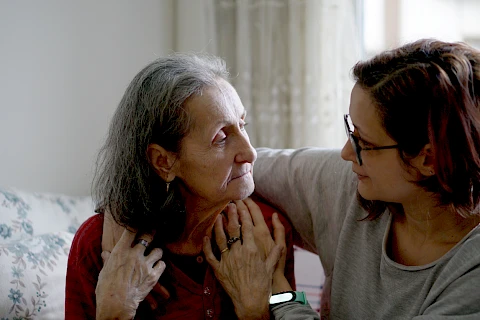
Alzheimer's disease, a degenerative brain disorder, profoundly impacts millions of seniors worldwide. One challenging aspect for caregivers is managing the behavioral changes that often come with the illness. These changes can range from slight shifts in personality to significant bouts of aggression and repetitive actions.
As a caregiver, understanding how to navigate these changes is crucial for the well-being of seniors and yourself. Senior Helpers will explore practical strategies for managing these behavioral changes, focusing on identifying underlying causes, leveraging positive reinforcement, and maintaining a consistent routine.
The Underlying Causes of Behavioral Changes
Navigating the behavioral changes in seniors with Alzheimer's begins with understanding the possible underlying causes. Several factors, such as physical discomfort, environmental stressors, or frustration from communication difficulties can drive these changes. As a caregiver, staying observant and empathetic can help in identifying the root causes.
Ensuring the senior's comfort on a physical level is important. Aches, illness, or discomfort can lead to distress. Alterations in the environment, such as a change of home or unfamiliar faces, can trigger anxiety. Lastly, frustration from being unable to communicate thoughts or needs can lead to agitation.
Understanding these causes allows you to anticipate potential issues and respond with appropriate solutions. For example, ensuring physical comfort may mean adjusting room temperature or providing pain relief, while reducing environmental stressors may involve maintaining a calm, familiar environment.
The Role of Positive Reinforcement
Positive reinforcement is an effective strategy for managing behavioral changes. This involves encouraging and rewarding desirable behaviors which will likely foster their repetition. Positive reinforcement can be praise, affection, or the provision of favorite activities or treats. For instance, if seniors enjoy painting, allowing them to indulge in this hobby after a period of calm behavior can reinforce positive action.
Implementing a system of positive reinforcement can contribute to a more peaceful environment and reinforce feelings of comfort and safety for seniors.
Maintaining a Consistent Routine
Consistency plays a prime role in managing behavioral changes for seniors with Alzheimer's. A routine can provide a sense of familiarity and security, thus reducing confusion and agitation. This can include consistent meal times, activities, and sleep schedules.
Punctuality and routine may seem simple, but for seniors with Alzheimer's, it can make all the difference. The aim is to minimize stress and create an environment of predictability that can help manage behavioral changes.
Addressing Specific Behaviors
Each senior with Alzheimer's is unique, and their behavior can vary significantly. Some may exhibit aggression, while others might engage in repetitive actions. Understanding these behaviors and knowing how to manage them is important.
Aggression often stems from frustration, fear, or discomfort. Identifying and addressing the underlying cause, whether it's physical discomfort or environmental stimuli, is the first step in managing this behavior. Remaining calm, speaking in a soothing voice, and providing assurance can often help defuse aggressive situations.
Repetitive actions, on the other hand, may be due to memory loss or boredom. Providing engaging activities can divert attention from repetitive behaviors. If the repetition is harmless and provides comfort to the senior, it may be best to allow it.
Contact Senior Helpers for Assistance With Alzheimer's Disease
Managing behavioral changes in seniors with Alzheimer's can be challenging, but with the right strategies, it can become manageable. Knowing the underlying causes, using positive reinforcement, and maintaining a consistent routine are powerful tools to have in your arsenal as a caregiver.
With these techniques, you can help create a calmer, more predictable environment for the seniors, improving their quality of life. Remember, you're not alone in this journey—support is available, and don't hesitate to reach out for help when needed.
For personalized assistance in caring for your loved one with Alzheimer's, click here to find a location near you. At Senior Helpers, we're committed to providing professional and empathetic care for seniors and their families.

